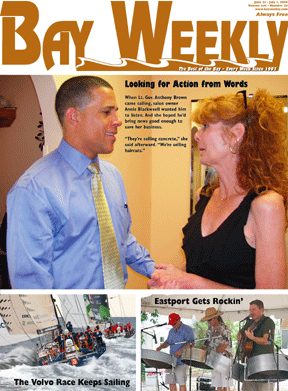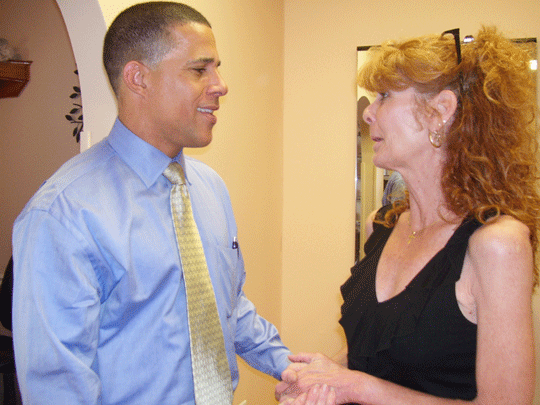
Volume XVII, Issue 26 # June 25 - July 1, 2009 |
 |
Looking for Action from Words
Can small businesses ride the stimulus gravy train? A single businesswoman asks the question.
by Sandra Olivetti Martin
Before Lt. Gov. Anthony Brown came calling, Chesapeake Beach hair stylist and salon owner Annie Logan Blackwell spent 36 hours getting ready. Blackwell — a resilient, delicatly built Maryland native with honey-colored Rapunzel hair — knows how to get people ready for special moments. Weddings, proms, galas and the challenge of everyday life: She makes a business of helping people look their best. She’ll even do her clients’ hair and makeup for their last big event, their funeral.
Looking good, however, was not the challenge Blackwell faced on Friday, June 19.
That day, for 10 minutes sometime between 11am and noon, she had to sound good.
 |
| Lt. Gov. Anthony Brown listens as Annie Blackwell describes the plight of small businesses reeling in this down economy. |
 Expectation
Expectation
Ten minutes of Brown’s time on his and Gov. Martin O’Malley’s whirlwind Capital for a Day tour of Calvert County. That’s the most she’d get, Blackwell figured, and she wanted to use it wisely. How to compress all the travails of the last two years in so short a time? How to speak, not only for herself, but also for small business owners wallowing in the wake of economic disaster? How, in short, to speak as Everywoman?
As she planned, stories and grievances marched through her head. How would she ever muster it into coherence?
Over two sleepless nights, she organized the problem into its three causes: reduced business, because her customers have less money to spend; ever-rising costs, including occasional late fees because she can’t always afford to pay all the bills each month; strangulating taxes and their noose of red tape.
She wanted to tell the lieutenant governor all that.
She wanted him to listen. And she hoped he’d bring news good enough to save her business.
Had Blackwell read the press release out of the governor’s office announcing Calvert’s day in the sun, she would have seen her hopes reflected in Brown’s words. “Now more than ever,” he was quoted as saying, “Maryland’s working families need leaders in Annapolis who are willing to stand up for them and put families first.”
Except Blackwell would have said, “I’m not a working family. I’m single. And it’s even harder for those of us who are on our own.”
Realization
About noon, the Beaches Trolley pulls up to the curb in front of Shear Perfection, Blackwell’s storefront salon and the oldest business in Chesapeake Station Shopping Center, adjacent to Rod ’n’ Reel, the biggest business in Chesapeake Beach.
Out of the trolley and into Blackwell’s salon pours an entourage: Brown fronted by three photographers, surrounded by local officials — including mayors Bruce Wahl of Chesapeake Beach and Mike Bojokles of North Beach — and Beach business people.
Blackwell’s face stiffens in a moment of horror: An animated party approaching two dozen is not what she expected. But Brown greets her, enclosing her in his personal space as politicians do so well. Blackwell lifts her chiseled chin and braces herself to carry out her mission.
“It’s tough. I’m 52, single, and I run a business. I own my home,” she says. “It was very profitable until things started to slide two years ago. Now I could lose everything.”
What she wanted to say, she says later, is that there have been ups and downs in this 25-year-old enterprise, opened by Pat Coyle, who still works part-time at the salon, mostly doing the hair of older women, and is here today to meet the lieutenant governor.
But never has it been so close to slipping away. Blackwell saved to remodel the business after she bought it 10 years ago. Just as the last and most expensive stage was under way, the bottom dropped out of the economy. That’s another way she’s doing more with less.
“If I lose the business,” she tells me, “I’ll lose my house. It’s all I have. And nine girls will lose their jobs.”
Brown is on a mission of his own. “I believe things will get better,” he says. “When we put federal stimulus money together, these people who [then] have jobs can frequent your business.”
Blackwell cringes back a step. When, she confides later, is a long way away.
She listens, and then she tries again. What about now, she asks. What about my business?
“The problem is,” Brown replies, “that stimulus money is not directed toward an establishment like this. It’s directed toward construction, teachers. Retail needs [that] diverse economy to keep people coming.”
From there, Brown rises to his official message: “Our goal is that three, almost four billion dollars of federal stimulus money will be applied through Maryland counties …”
The big picture of recovery is lost on Blackwell. She cannot see beyond the picture of her own circumstances, her own community, because it is smashed against her face.
Reconciliation
After Brown is gone, after the handshakes and photographs and greetings all around, Blackwell sizes up her 10 minutes of official time.
“He himself was very pleasant,” she says.
“But it wasn’t what I was hoping for. There’s nothing for us. This is not construction. They’re selling concrete. We’re selling haircuts. But these girls have educated themselves. They have licenses. They buy their own tools. They stand on their feet and listen to people’s problems all day.
“They deserve help, too.”
In the governor’s press release, Brown followed up his words about Maryland families with one more sentence: “I’m proud that Governor O’Malley and I, with help from President Miller and the General Assembly, have been able to protect the progress we’ve made even — and especially — during difficult times.”